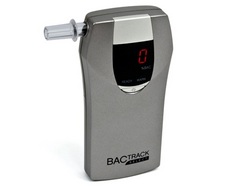
Standard Breathalyzer
If I get pulled over, do I have to take a breathalyzer, blood test, or urine test?
If you a driver and you are pulled over for a DUI, you must take a breathalyzer, blood test, or urine test. When you get a license, this is called the “implied consent” law. If you refuse to, it can result in a 3-12 month license suspension (“If I'm Stopping for Driving”).
What’s the easiest way to know if I’m too drunk to drive?
Perform a standard field sobriety test on yourself. Try to walk in a straight line (heel to toe), tip your head back and try to touch the tip of your nose with your index finger (make sure you close your eyes), stand on one foot, and reciet the alphabet ("Too Drunk to Drive?").
How do I know if a driver is intoxicated on the road?
The most common signs of a drunk driver are swerving, speeding, failing to stop, and/or even driving too slowly ("How Can the Police"). Other signs include weaving within the given lane, wandering from one lane to the next, running off the pavement, stopping too quickly or too slowly, going through stop signs, lights, or violating other road signs, and/or driving on the wrong side of the road ("Drunk Driving Accident").
What happens if I'm a passenger when getting pulled over for an expected DUI?If you are the passenger as you fail to identify the driver so that the police can't figure out the identity of the driver, you can be charged as "In Charge" of the vehicle also ("Drink Driving"). For the driver, they can face more charges if they have a passenger in the car 16 years or under ("Underage Drinking").
What are the consequences of an underage DUI?
Consequences for underage DUIs include fines ranging from $100-$2,500, car impounded, drug/alcohol and driver's e\d classes, 30-60 days of community service, taking driver's license away, revoking driving privileges for 90 days-3 years, jail time (2 days-1 year), and probation for 3-5 years ("Consequences of an Underage")
If you a driver and you are pulled over for a DUI, you must take a breathalyzer, blood test, or urine test. When you get a license, this is called the “implied consent” law. If you refuse to, it can result in a 3-12 month license suspension (“If I'm Stopping for Driving”).
What’s the easiest way to know if I’m too drunk to drive?
Perform a standard field sobriety test on yourself. Try to walk in a straight line (heel to toe), tip your head back and try to touch the tip of your nose with your index finger (make sure you close your eyes), stand on one foot, and reciet the alphabet ("Too Drunk to Drive?").
How do I know if a driver is intoxicated on the road?
The most common signs of a drunk driver are swerving, speeding, failing to stop, and/or even driving too slowly ("How Can the Police"). Other signs include weaving within the given lane, wandering from one lane to the next, running off the pavement, stopping too quickly or too slowly, going through stop signs, lights, or violating other road signs, and/or driving on the wrong side of the road ("Drunk Driving Accident").
What happens if I'm a passenger when getting pulled over for an expected DUI?If you are the passenger as you fail to identify the driver so that the police can't figure out the identity of the driver, you can be charged as "In Charge" of the vehicle also ("Drink Driving"). For the driver, they can face more charges if they have a passenger in the car 16 years or under ("Underage Drinking").
What are the consequences of an underage DUI?
Consequences for underage DUIs include fines ranging from $100-$2,500, car impounded, drug/alcohol and driver's e\d classes, 30-60 days of community service, taking driver's license away, revoking driving privileges for 90 days-3 years, jail time (2 days-1 year), and probation for 3-5 years ("Consequences of an Underage")
